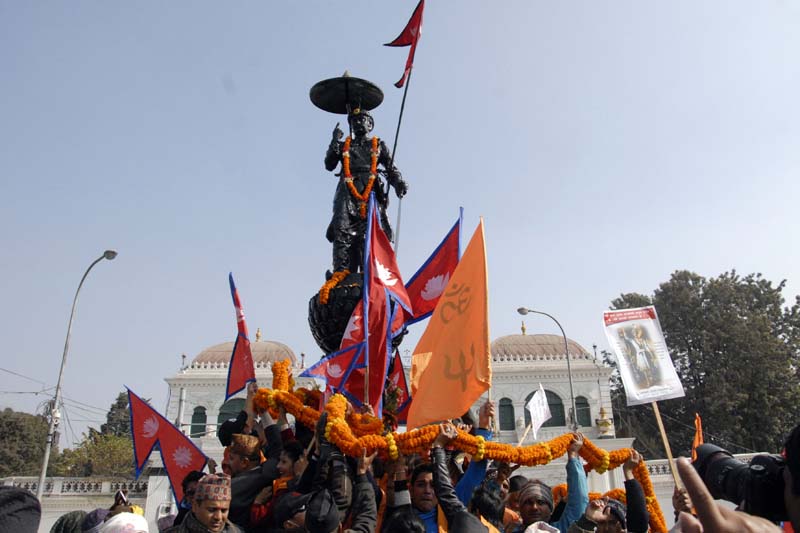Prithvi Narayan Shah’s role in national unification can’t be ignored
Kathmandu, January 10
As the country marks 296th birth anniversary of King Prithvi Narayan Shah and National Unification Day tomorrow, it is a sombre occasion for all Nepalis to objectively recognise the significance of the Nepali nationhood and the national rebuilding process in the changed context.
This discourse of national rebuilding calls for a thorough and candid evaluation of the role of Prithvi Narayan Shah, the architect and unifier of modern Nepal, more than ever with the country transforming into a federal democratic republic.
The people’s war, waged by the then CPN (Maoist), although started on the foundation of public grievances of social, cultural and other forms of discrimination by the then state, later rallied around on the identity issue. The proponents of the people’s war strongly raised the ethnic issues and banked on it to mobilise public support for their cause.
It was in this phase that the ethnic issues began to surface and be voiced more vigorously. Some people and scholars began to question the very rationale of the unification campaign launched by Shah. They argued that the late king had started the unification campaign as a ruthless warrior than with the pious motive of unifying the country and started projecting him as a warlord than a statesman.
The nation passed through a civil war-like situation in the aftermath of the People’s War until the signing of the Comprehensive Peace Accord in 2005. This was a turning point in Nepal’s history followed by a succession of political developments, eventually transforming the country into a federal republic.
The birth anniversary of King Prithvi Narayan Shah used to be marked as the National Unification Day at the state level. But the successive governments after 2006 dropped the idea, although some political parties and groups continued with the tradition on their own.
Meanwhile, the government this time has announced a public holiday tomorrow on the occasion of the birth anniversary of Shah. The Ministry of Home Affairs has circulated a notice in this regard through its website.
Speaking at an interaction organised by Nepal Academy to discuss Shah’s role in national unification, CPN-UML senior leader Jhalanath Khanal said foreign meddling in the country should be challenged unitedly.
Satya Mohan Joshi said national unity would be strengthened if Nepal Rastra Bank printed Prithvi Narayan Shah’s picture on Nepali banknotes. Likewise, culture expert Jagman Gurung said the government should mark the unity day recalling the contributions made by Shah who preserved different cultures by uniting the nation.
Prof Ramesh Dhungel, Prof Surendra KC, Birendra Mishra and Academy’s Chancellor Ganga Prasad Upreti recalled the role of Shah in uniting many principalities into a single country. The purpose of discussing this background here is to put into context the significance of the National Unification Day.
People might differ on the role of Prithvi Narayan Shah and whether the unification campaign he started was only a geographical unification or truly a national unification. But the fact is that modern Nepal was built with the great efforts of King Prithvi Narayan Shah. The historical conditions during his time were different than today and he should be judged in that perspective. We should learn to respect history.






